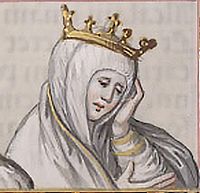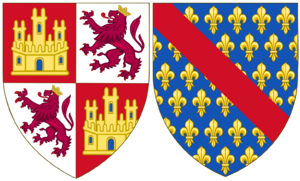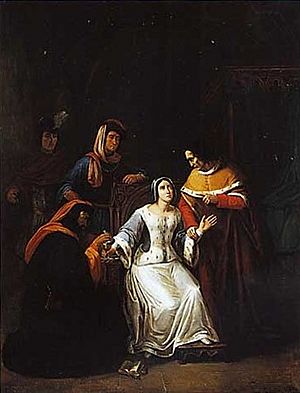Blanche of Bourbon facts for kids
Quick facts for kids Blanche of Bourbon |
|
|---|---|
 |
|
| Queen consort of Castile and León | |
| Tenure | 1353–1361 |
| Born | 1339 |
| Died | 1361 Medina Sidonia |
| Spouse | Peter of Castile |
| House | House of Bourbon |
| Father | Peter I, Duke of Bourbon |
| Mother | Isabella of Valois |
| Religion | Roman Catholicism |
Blanche of Bourbon (born 1339, died 1361) was a queen of Castile. She was the wife of King Peter. Blanche was the daughter of Peter I, Duke of Bourbon, and Isabella of Valois.
Becoming Queen of Castile
Blanche married King Peter of Castile on June 3, 1353, in Valladolid, Spain. She was only 14 years old. Before this, they had a proxy marriage, which means someone stood in for them, in France in 1352.
This marriage was important because King Peter wanted to create a strong alliance with France. However, some historians believe King Peter had already secretly married another woman, Maria de Padilla, before he married Blanche. He denied this. There were also problems getting the money promised as Blanche's dowry.
Just three days after their wedding, King Peter left Blanche. He went back to Maria de Padilla, with whom he later had four children.
Imprisonment and Death
Blanche was later imprisoned in the castle of Arevalo. Her cousin, John II of France, asked Pope Innocent VI to help Blanche. He wanted the Pope to punish King Peter for keeping Blanche locked up. However, the Pope refused to do this. Blanche and Peter never had any children together.
In 1361, Blanche was moved to the town of Medina Sidonia. This was done to keep her far from any possible rescue attempts. The Pope continued to ask for her release.
Blanche died in 1361. There is some debate among historians about how she died. Some accounts say King Peter ordered her to be killed. Other stories suggest she died naturally or was poisoned with herbs. It is known that she died in Medina Sidonia at the age of 25.
Over the years, different stories about King Peter were written. Some called him "Peter the Cruel," while others called him "Peter the Just." This is because later rulers, who were related to both Peter and his half-brother, wanted to make the history seem less harsh.
See also
 In Spanish: Blanca de Borbón para niños
In Spanish: Blanca de Borbón para niños
 | Delilah Pierce |
 | Gordon Parks |
 | Augusta Savage |
 | Charles Ethan Porter |



